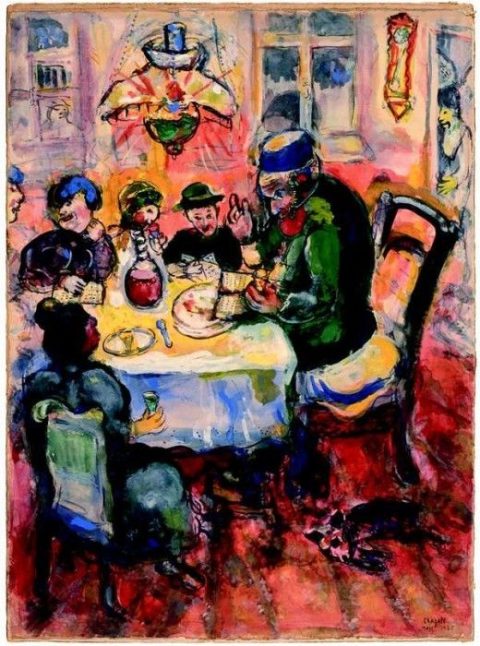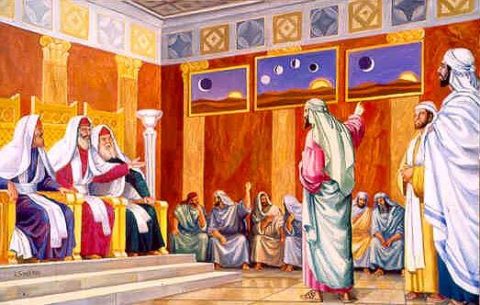Acharei Mot/Kedoshim – Lev. 16:1-18:30/19:1-20:27 (Apr. 23/24)

As the Torah Turns
Rabbi Lader’s Weekly D’var Torah
Acharei Mot/Kedoshim – Lev. 16:1-18:30/19:1-20:27 (Apr. 23/24)
This week we have a double Torah portion – Acharei Mot/Kedoshim – Lev. 16:1-18:30/19:1-20:27. Much of the text is about what it means to be holy… and our inter-personal relationships. These relationships – these sexual relationships, specifically between two men – have been the basis for traditional views on homosexual relationships. Over two millennia have passed, and with the passage of time, has come the realization that there are indeed other perspectives to inform our understanding of what of means to be in a loving relationship. The following describes the Reform movement’s views on LGBTQ equality, and how that view is informed by looking at the larger picture of the Torah texts – and the ethical rationale behind the laws.

LGBTQ EQUALITY & REFORM JEWISH VALUES
The organized Reform Jewish community is committed to securing civil rights for LGBTQ individuals. We are guided by the basic belief that all human beings are created b’tzelem Elohim, in the Divine image, as it says in Genesis 1:27,
“God created humans in God’s image, in the image of God, God created them; male and female God created them.”
As Jews, we are intimately acquainted with the effects of bigotry. Our ancestors knew both the continuing indignities of second-class citizenship and the constant fear of xenophobic violence; this history teaches us that discrimination against any members of a community threatens the security of the entire community.
The two Biblical texts that opponents of equality most often cited are both found in the book of Leviticus. In a discussion of sexual behavior, the Israelite men are instructed,
“Do not lie with a male as one lies with a woman; it is an abhorrence” (Leviticus 18:22).
Later text reaffirms,
“If a man lies with a male as one lies with a woman, the two of them have done an abhorrent thing; they shall be put to death – their blood guilt is upon them” (Leviticus 20:13).
How can Jews resolve the apparent conflict between Leviticus’s harsh prohibitions and the moral obligation to speak out against the injustices that afflict LGBT individuals? We can begin by remembering this verse that sits directly between the two: Leviticus 19:18 reads,
“You shall love your neighbor as yourself.”
Leviticus approaches same-sex relationships as necessarily promiscuous, and possibly oppressive, because they never occurred in the context of loving families. The intent of these laws, then, is to forbid promiscuous relationships. Because the Torah does not directly address the issue of loving, monogamous, homosexual couples, we must turn to the more general ethical framework of the Torah for guidance. As Rabbi Harold Schulweis explains,
“Morality comes from reading the tradition in its entirety – not singling out particular verses or particular laws. It comes from highlighting the ethical rationale behind the laws, including the many interpretations of law, and it comes from wisdom, Jewish experience and history.”
Learn more about the Reform Jewish community’s work for LGBTQ rights at RAC.org/lgbt. May we all find holiness in our lives through our sacred acts of lovingkindness and loving relationships. We are very pleased to share that BI-TWT has been recognized by Keshet as an “open and affirming” temple for LGBTQ+ Jews! https://www.keshetonline.org/resources-and-events/equality-directory/?ajax_nonce=953a45813f&offset=0&root_url=https%3A%2F%2F www.keshetonline.org%2Fresources-and-events%2Fequality-directory%2F&organization_category&organization_affiliations&search_location=44149&selected_country=United%20States#1486923
From Previous Weeks

Shemini – Lev. 9:1-11:47 (Apr. 9/10)
When loss occurs…these texts reflect our nature to seek answers…

Exodus 13:17-15:26 (Apr. 2/3)
Even as we celebrate our redemption from slavery, we have a responsibility to remember the whole story.

Tzav – Lev. 6:1-8:36 (Mar. 26/27)
Moses learns about the details and procedures of the sacrifices.

Mishpatim – Ex. 21:1-24:18
The opportunity to create change – or to be change agents – is always before us.

